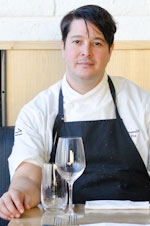Interview with 2013 San Francisco Bay Area Rising Star Chef Jason Fox
Katherine Sacks: Why did you decided to pursue cooking professionally?
Jason Fox: I got into cooking because I like food, I like the sort of creative outlet of it. I used to do a little art when I was younger but wasn't quite good at it. I guess also the fact that I'll never know everything about food. Every day is a learning experience; I don't think I’ll know everything there is to know, it’s just an ever increasing, widening education of things.
KS: How did you get started in your culinary career?
JF: I didn't go to culinary school, I cooked when I was in high school. Those were really some of the first jobs, dishwashing/cooking. I cooked throughout college when I studied business at University of Arizona. I moved out here 18 years ago, I’ve been working out here for the last 18 years.
KS: How would you describe your style?
JF: We say progressive American. I think first and foremost we start with the product. Being here in Northern California, it’s pretty produce driven. I start with that, and then we kind of like to play with our food a little. For us it’s trying to present something in unfamiliar ways, present some familiar thing in other ways. Texture is really important, also looking at how flavors play off each other, going from sweet to salty, having a lot of umami there.
KS: Who has been your most influential mentor?
JF: I worked under Loretta Keller at Bizou for about two years. There was almost nothing we didn't see, she used all the parts of the animals, everything, before it was en vogue, cooking pork belly, cooking sheep. I saw everything, there was almost no California products I didn't see there. She's great.
KS: Where do you find inspiration?
JF: For us it’s just using different ingredients, it’s eating out a lot. Spain is also a huge influence; I have a brother who lives in Barcelona so I go there every two years. I’ve been to Europe, Southeast Asia, Africa, and adapt it all into my personal cuisine. With Japanese, the citrus, the spice, it all makes sense. It’s just an aesthetic of trying to make everything clean and balanced.
KS: How did the team of Commonwealth come together?
JF: All the partners worked together worked at Bar Tartine. We left and opened this. We came here and now we're the owners; our rule is to make good food, authentic food.
KS: What does authentic food mean?
JF: I think for awhile here in San Francisco you were doing Italian and people wanted to see really regional Italian, and people wanted to see just that. We’re not worrying about those rules. It’s not being fusion, not making wasabi mashed potatoes, that seems inauthentic, or out of jars and cans. We have Japanese farmers, Mexican farmers, North African farmers. What’s grown in San Francisco has a worldwide view, and we take it all try and make it authentic to us. It’s honest cooking I guess.
KS: Tell me about the community that Commonwealth is creating?
JF: We've been here 2 and a half years. We batted a lot of names around. I think in any food sense it was sort of us taking an esthetic of fine dining and doing it more approachable. I love David Kinch, love Dominique [Crenn], love Coi, love Benu, but I don’t go there very often. Commonwealth is sort of for everyone and also has a social agenda: $10 of every tasting menu goes to a charity. We change the charity every month, and have gone thorough 25 charities since we've started. We try to downplay it too, we want to just be taken as a restaurant. We worked that into our business plan to force us to help along the way. In this day and age we are lucky enough to have a restaurant in San Francisco, we’re lucky enough to be in the position to be in a city were we can run a restaurant, it doesn't seem that hard to give back a little.
KS: Where will we find you in 5 years?
JF: Still here in San Francisco, maybe working on some other projects. I think it would be fun to have different styles, different look for the next place. Bigger, more casual not as fussy.

Chef Jason Fox
Commonwealth Restaurant2224 Mission Street
San Francisco, CA 94110
www.commonwealthsf.c..
Twitter@ChefJFox





